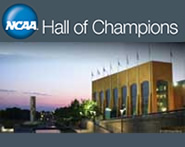NCAA News Archive - 2009
« back to 2009 | Back to NCAA News Archive Index
|
|
By Julia Hada
The NCAA News Stepping onto a sheet of ice in full hockey gear is not something their mothers would have even contemplated, but for two-time Division III Women’s Ice Hockey Championship-winning Plattsburgh State seniors Ainsley Brien and Tara Khan, it was all they thought about as children. “It’s like what we told the girls before the tournament this year: You can’t take anything for granted," Khan said. “Some girls would kill to be in our shoes,” added Brien. Many current female collegiate athletes also are fulfilling a dream of their mothers, who did not have the same – or even any – opportunities in their late teens and early 20s. Gender and sports was the topic of a recent roundtable discussion held by Plattsburgh State’s Women’s Studies Department. It featured Brien and Khan, along with associate librarian Mina Su and Athletics Director Bruce Delventhal, as speakers. Su provided a historical look at the governmental and legislative developments that have helped to shape and nurture women’s athletics, including the 1972 Patsy T. Mink Equal Opportunity in Education Act, or Title IX. Many incoming female athletes admit to not even realizing the effects of Title IX, as athletics has become more gender-neutral for the current generation. “Title IX is not an issue to them, but it is important for them to know about it,” Delventhal said. “Women’s teams have brought so much to be proud of to Plattsburgh.” Delventhal acknowledged the great leaps he has seen in the acceptance of female athletes over the years by society, and entertained the largely female crowd in the Hawkins Hall lecture room with an anecdote shared with him by a Plattsburgh State faculty member. She had taken her son and his friends to the Cardinal women’s hockey games during the year due to the free admission, and when the boys would play street hockey in the driveway, they often would pretend to be the female skaters they had been going to see. “One day she asked him if he would like to go to a men’s hockey game that night and he gave her this look of disbelief like, ‘Men play hockey too?’ ” Delventhal said. “It was definitely a turning-point sort of moment.” Growing up in Canada, neither Brien nor Khan really thought anything of it when they had to play on male hockey teams in Pee Wee Hockey. “But when I got to be about 16, size became an issue,” remembered Khan. “The guys were about 6-foot-0 and I was only 4-foot-11.” So Khan, along with her mother and coach, helped form the Pacific Steelers. The all-female squad participated in Provincials and provided Khan the opportunity to keep playing hockey competitively until she came to Plattsburgh State two years later. “In Ontario (where Brien is from), women’s hockey was so much more developed, but on the West Coast it was different," Khan said. “We ended taking two teams to Provincials from Ontario, because we just had that many people,” Brien said. While the opportunities for female athletes in hockey and a number of other sports have grown, Khan and Brien suggested differences in fan support still is a factor between men’s and women’s sports. They showed pictures from the Plattsburgh State men’s and women’s teams’ participation in their respective Division III championships in 2008. The arena was packed for the men, while the women’s game had a number of open seats in a much smaller arena. “People have to start realizing that when they go to a women’s game, they aren’t going to get the same game as a men’s,” Delventhal said. “Women’s hockey is not the same sport as men’s, but you definitely have to appreciate it.” Though some disparity is still present, Delventhal pointed to a number of positives that resulted from enacting Title IX in 1972. “Our women athletes are much more direct and confident than the male athletes, and that confidence factor is one of the great things that intercollegiate sports have brought to the table. “My wife was a figure skater, a good one at that, and she has commented to me a number of times what she wouldn’t give to go back in time and be able play hockey like our women do now.” Julia Hada is assistant director of sports information at Plattsburgh State |
||||||||||||||||||
© 2010 The National Collegiate Athletic Association
Terms and Conditions | Privacy Policy


